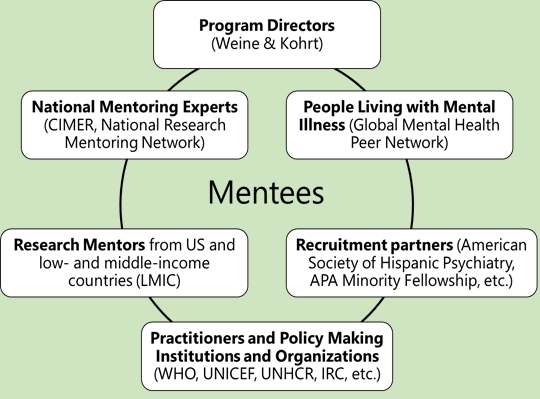gmhCONNECT
GMH CONNECT Heading link
Global Mental Health Research on SoCial Drivers Of MeNtal IllNessEs aCross The Lifespan
The gmhCONNECT will build a research education program on social driver interventions in global mental health. The program is based at the University of Illinois College of Medicine and George Washington University with a large U.S. and international faculty of senior global mental health researchers. This program targets graduate and health professional students, medical residents, postdoctoral trainees, and early-career faculty who are U.S. citizens and permanent residents who are planning to submit or currently funded through NRSAs, K awards, Fogarty Fellowships, or project grant.
The purpose of this program is to facilitate their success as independent researchers and members of the research community in global mental health. Our program highlights intervention research concerning how social drivers impact mental illness, prevention, and care for populations in low-and middle-income countries (LMICs) and other low-resource settings.
Program Overview Heading link
The overall goal is to facilitate the success of graduate and health professional students, medical residents, postdoctoral trainees, and early-career faculty who are U.S. citizens or permanent residents, as well as early career researchers as independent GMH researchers by providing specialized training and mentorship which addresses the unique challenges and complexities of social driver intervention research in GMH. The purpose of this program is to facilitate their success as independent researchers and members of the research community in global mental health. Forty mentees will receive dyadic/triadic mentorship, group mentorship, and participate in the summer institute and collaborative activity group, ultimately resulting in a sustained personal mentoring network. Forty mentors are trained on mentoring skills. And, a sustainable gmhCONNECT network will be formed with 100+ members.
Program Overview Heading link

To achieve this goal, the program will address the following aims:
- Aim 1: Provide training, primarily through a Summer Institute, which advances the trainees’ research knowledge and skills on the ways in which social drivers impact mental illness, prevention, and care and how social drivers and their impact can be addressed through interventions.
- Aim 2: Provide one-year of focused intensive mentorship (dyadic and triadic) from a US and LMIC pool of multidisciplinary and diverse GMH experts to support the mentees’ research interests and career trajectories.
- Aim 3: Provide a range of synergistic guided learning opportunities including group mentorship, structured peer mentorship, and engagements with people living with mental illness and practitioners at implementing organizations, which will enable trainees to form their unique mentoring networks.
- Aim 4: Evaluate the impact of gmhCONNECT on the mentee’s networks, knowledge and productivity, with an emphasis on equity and collaboration when evaluating productivity metrics.
How to Apply Heading link
-
How to Apply
Ten mentees will be recruited for a 1-year program of training and mentorship that includes a Summer Institute, Intensive Mentoring, and Group Mentorship events. The program will be offered for 4 years, enrolling a total of 40 mentees. Certificates of completion are provided for all mentees who fulfill the expected commitments.
Expected Commitment of Accepted Mentees:
- Participation in person in 1-week-long gmhCONNECT Summer Institute, June 2-6, 2025 at George Washington University in Washington, D.C.
- Participation in intensive individual and group mentorship (approximately 2 mentorship virtual meetings per month) for 1 year
- Participation in other gmhCONNECT networking events
- Development or revision of a grant application for GMH-related research (e.g., F31, F32, K, or first R-award)
- Completion of collaborative mini-project to advance GMH research, policy, or practice
Eligibility:
Demonstrated interest in GMH or social-drivers-related research (e.g., structural determinants of health; humanitarian health; impacts of stress, adversity, and trauma), social drivers-related field. Applicants must be currently in training for a graduate degree or comparable level or have completed a graduate degree (e.g., MD, PhD, DrPH). Given the multidisciplinary scope of the research training program, we will recruit trainees from diverse disciplines in mental health, public health, medicine, psychology, and social sciences (e.g., anthropology). Members of underrepresented racial or ethnic groups will be actively recruited to participate.
Criteria include:
- Predoctoral students who have completed their doctoral coursework and qualifying exams; and postdoctoral and early-career professionals within 6 years of completing terminal degrees;
- US citizen, non-citizen US national, or permanent US resident;
- Research experience in GMH or social drivers research (e.g., related to poverty, discrimination, violence, or other adversity);
- Institutional support as demonstrated by 2 letters of recommendation (e.g., from primary research mentor, current department head, LMIC supervisor, community-based collaborator).
- Priority will be given to participants from Populations Underrepresented in the Extramural Scientific Workforce as defined by NIH (see Notice of NIH’s Interest in Diversity, NOT-OD-20-031), as well as persons who belong to an underrepresented ethnic, racial, and/or regional group; have disabilities; have direct experience living or working within LMICs; and/or identify as cis-female or LGBTQIA+
Application Information:
Please email Chloe Polutnik at cpolut2@uic.edu with the required application documents (outlined below).
Deadlines:
- Application deadline (February 4, 2025) – applications will be reviewed on a rolling basis; early applications are encouraged
- Notification of decision (February 28, 2025)
Documents to submit:
- Letter of intent. Please use the following structure for your letter of intent:
- Your training and career background (250 words)
- Your current and prior research experiences (250 words)
- Your long-term research and career goals in relation to the field of GMH (150 words)
- How the gmhCONNECT program will contribute to your long-term goals (150 words)
- Proposed project you want to start or further develop with mentorship: summary of goals, aims, sites (300 words)
- Two letters of recommendation, and
- Your NIH biosketch (maximum 5 pages)
Costs:
- There are no costs for participation for accepted mentees in the network
- Funds are provide to defer travel and accommodation costs
- No funds are provided for research activities
Leadership Heading link
Stevan Weine M.D.

Professor, Department of Psychiatry
Director of Global Medicine & Director of the Center for Global Health
University of Illinois College of Medicine
Brandon Kohrt, MD, PhD

Charles and Sonia Akman Professor of Global Psychiatry
Associate Professor of Psychiatry and Global Health
Director of the Division of Global Mental Health
George Washington University
Leadership Committee Heading link
-
Leadership Committee
Pamela Collins, MD, MPH
Professor of Psychiatry and Behavioral Sciences and Professor of Global Health Executive Director of I-TECH and Director of the UW Consortium of Global Health, University of Washington
Milton Wainberg, MD
Professor of Clinical Psychiatry at Columbia University/New York State Psychiatric Institute
Director of the NIMH-funded Columbia University Global Mental Health Implementation Science T32-Post Doctoral Fellowship
Dr. Roberto Lewis-Fernández, MD
Professor of Clinical Psychiatry at Columbia College of Physicians and Surgeons
Director of the New York State (NYS) Center of Excellence for Cultural Competence and the Hispanic Treatment Program
Co-Director of the Anxiety Disorders Clinic, at NYS Psychiatric Institute
Emily Mendenhall, PhD, MPH
Professor in the Edmund A. Walsh School of Foreign Service at Georgetown University
Honorary Professor, Faculty of Health Sciences, University of the Witwatersrand, South Africa